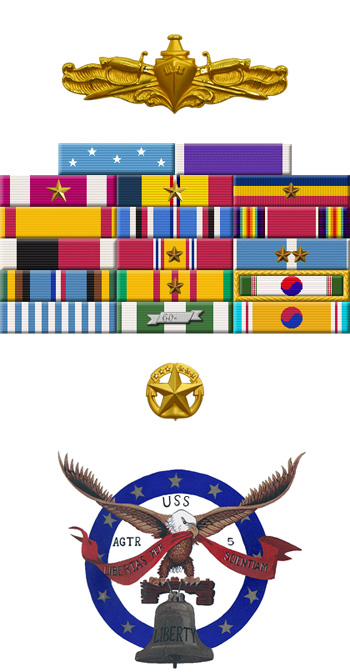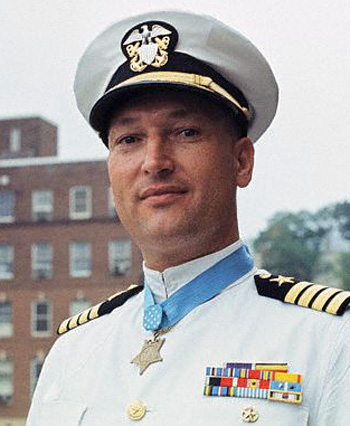William McGonagle was born on November 19, 1925, in Wichita, Kansas. He enlisted in the U.S. Navy in January 1944 and was commissioned through the Navy ROTC program at the University of Southern California in June 1947. His first assignments were aboard the destroyer USS Frank Knox (DD-742) and the minesweeper USS Partridge (AMS-31) between 1947 and 1950, and then he served aboard the minesweeper USS Kite (AMS-22) in 1950 and 1951, during the Korean War. McGonagle commanded the fleet tug USS Mataco (ATF-86) from 1957 to 1958, and the salvage ship USS Reclaimer (ARS-42) from 1961 to 1963. CDR McGonagle served as the commander of the technical research ship USS Liberty (AGTR-5) from April 1966 to June 1967, when the ship was badly damaged during a strike by Israeli aircraft and ships on June 8, 1967, during the Six-Day War. McGonagle was injured during the attack and was later awarded the Medal of Honor for this action. Capt McGonagle next took command of the ammunition ship USS Kilauea (AE-26) in October 1967, and then commanded the Navy ROTC detachment at the University of Oklahoma. Capt McGonagle's final assignment was at the Joint U.S. Military Assistance Group in the Philippines, where he retired from the Navy in 1974. William McGonagle died on March 3, 1999, and was buried at Arlington National Cemetery.
His Medal of Honor Citation reads:
For conspicuous gallantry and intrepidity at the risk of his life above and beyond the call of duty. Sailing in international waters, the Liberty was attacked without warning by jet fighter aircraft and motor torpedo boats which inflicted many casualties among the crew and caused extreme damage to the ship. Although severely wounded during the first air attack, Capt. McGonagle remained at his battle station on the badly damaged bridge and, with full knowledge of the seriousness of his wounds, subordinated his own welfare to the safety and survival of his command. Steadfastly refusing any treatment which would take him away from his post, he calmly continued to exercise firm command of his ship. Despite continuous exposure to fire, he maneuvered his ship, directed its defense, supervised the control of flooding and fire, and saw to the care of the casualties. Capt. McGonagle's extraordinary valor under these conditions inspired the surviving members of the Liberty's crew, many of them seriously wounded, to heroic efforts to overcome the battle damage and keep the ship afloat. Subsequent to the attack, although in great pain and weak from the loss of blood, Captain McGonagle remained at his battle station and continued to command his ship for more than 17 hours. It was only after rendezvous with a U.S. destroyer that he relinquished personal control of the Liberty and permitted himself to be removed from the bridge. Even then, he refused much needed medical attention until convinced that the seriously wounded among his crew had been treated. Capt. McGonagle's superb professionalism, courageous fighting spirit, and valiant leadership saved his ship and many lives. His actions sustain and enhance the finest traditions of the U.S. Naval Service.
|



